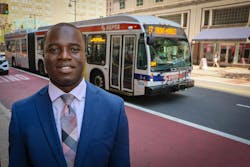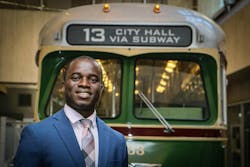One word to describe yourself: Conscientious
Alma Mater: Kwame Nkrumah University of Science and Technology; University of Pretoria; Temple University
Fast fact about yourself: In the late 1990s, I was part of a trombone choir that released two albums: one featuring classical music and the other composed of Christmas carols.
Philip Asabere, senior program manager, Southeastern Pennsylvania Transportation Authority (SEPTA), began his career at SEPTA as a project engineer in the engineering department. Within five years, he advanced to director of civil engineering. During his tenure in engineering, Asabere played a key role in maintaining and improving SEPTA’s aging right-of-way infrastructure.
Asabere now plays a key role in the implementation of SEPTA Key 2.0—a next-generation fare collection system designed to modernize revenue operations and enhance the rider experience. Stepping into a completely new field, he adapted quickly and brought fresh energy and structure to an essential initiative, exemplifying his versatility and commitment to the mission.
In assuming leadership of SEPTA’s New Payment Technologies Group, Asabere significantly expanded his responsibilities. He now oversees a program valued at over $500 million. He regularly briefs senior leadership and the SEPTA Board on the status and strategic direction of revenue collection systems and works across departments—including IT, finance, capital planning, engineering, planning and operations—to ensure cohesive and forward-thinking on the implementation of SEPTA Key 2.0.
Asabere has also taken on a prominent external-facing role, representing SEPTA in public forums such as the Citizen Advisory Committee, Youth Advisory Committee and various advocacy groups. He serves on the Fare Evasion Working Group, a cross-departmental committee that includes representatives from innovation, police and finance. Through this group, he has supported the installation of fare control gates at high-ridership stations, contributing to a 50 percent reduction in fare evasion.
In his previous role, Asabere implemented a modernized, state-of-the-art right-of-entry process to manage third-party access to SEPTA’s right-of-way. This system replaced a cumbersome, paper-based process and greatly improved coordination and safety. Additionally, he led the development of the framework for SEPTA’s Climate Resiliency Program, laying the foundation for future infrastructure investments that will help safeguard the transit network against climate-related risks.
As a member of the National Society of Black Engineers (NSBE), Asabere actively mentors students and young professionals. He recently served as a speaker at the NSBE Region 2 Conference and as a panelist for the Region 2 Engineering Week Workshop. While serving as director of civil engineering, Asabere also established a high school internship program in partnership with Boys’ Latin High School in Philadelphia to offer senior students a chance to shadow engineers and gain firsthand exposure to careers in STEM. He is currently working to expand the program to include opportunities in the New Payment Technologies Group, further broadening access and career pathways for underrepresented youth in the region.
Is there a specific experience that led you to where you are today?
As a child growing up in Ghana during the 1990s, I witnessed firsthand the lack of essential social amenities like good roads, access to clean water and reliable electricity in many communities. Even at that young age, I felt a sense of injustice and made a promise to myself that I would work to change this situation. When it was time for college, I chose to study civil engineering, with the goal of addressing these issues.
My early career was primarily focused on supporting safe mining operations in Ghana. However, my journey took a significant turn, leading me to become deeply involved in water treatment and supply projects across Ghana and the broader African continent. Today, I am dedicated to advancing safe, reliable and equitable transportation services for the residents of southeastern Pennsylvania.
What do you enjoy most about your job?
Philadelphia has a notable number of households that don't own vehicles, resulting in a lower than average of cars per household. This circumstance leads to significant reliance on public transportation, especially in low to middle-income neighborhoods. Children take buses and subways to school while adults rely on the system for their commute to work.
Even those needing medical care utilize these services to reach healthcare facilities. I’m proud to be part of the team that supports public transportation for the wonderful people in our community.
What’s the most challenging part of your job?
On a daily basis, I engage with a variety of stakeholders both within and outside of SEPTA, whose support is crucial for the successful rollout of my projects. Some of these stakeholders are not technical and directly use the engineering solutions I develop while others possess technical knowledge that is limited to their own areas of expertise. The primary challenge I face is effectively explaining technical issues related to these solutions in a manner that secures their buy-in and support. Over the years, I've found that clear communication and transparency are key to bridging this gap and fostering collaboration.
What is the accomplishment you’re most proud of and why?
In Ghana, the first year of work following graduation from tertiary institutions is recognized as a national service to the nation. Through the national service scheme, graduates are assigned to various sectors, mainly within the public domain, regardless of their field of study. Engineering students were included in this initiative as well.
During my tenure as president of the Ghana Engineering Students Association, I collaborated with the Ghana Institution of Engineers and the Association of Ghana Industries to establish a pathway for posting engineering students to relevant firms starting in 2008. I take great pride in this achievement as the national service program provides valuable hands-on training, which greatly enhances the prospects of graduates in job applications and further education opportunities.
What is an accomplishment you would like to work towards in your career?
I’m actively working to enhance my expertise in mass transit and public transportation. My goal is to contribute to the development of efficient passenger and freight rail systems across sub-Saharan Africa. I believe that such initiatives will lead to fairer access to transportation and ultimately boost socioeconomic activities in the region.
What is your best advice/tip/best practice you can share from your area of expertise?
I recommend that engineers, particularly those who are just starting out, should leverage job interviews to assess their prospective supervisors. The quality of your work and your enthusiasm for engineering can significantly depend on the leader you have, especially in your formative years. Prepare to inquire about opportunities for personal development, mentorship and training during the interview process. Additionally, if possible, investigate your hiring manager both before and after the interview to determine if they will support your professional advancement.
About the Author
Brandon Lewis
Associate Editor
Brandon Lewis is a recent graduate of Kent State University with a bachelor’s degree in journalism. Lewis is a former freelance editorial assistant at Vehicle Service Pros in Endeavor Business Media’s Vehicle Repair Group. Lewis brings his knowledge of web managing, copyediting and SEO practices to Mass Transit magazine as an associate editor. He is also a co-host of the Infrastructure Technology Podcast.




